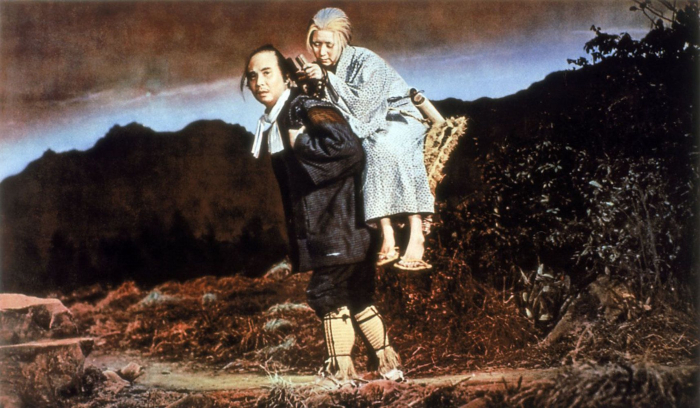A man climbs the steep path that leads to an icy mountain peak. His face turns red for the effort, he goes ahead breathless, because he is carrying a special load, tied to his back: his old and sick mother. The cold wind whips his face, but he doesn’t give up – he knows that what he is about to do, should be done. He will climb up the hill to the big glacier, to the plateau beyond the clouds, where the stones look like blades of rock and the draughts cruelly whip the sheets of hardened snow. There he will leave her.
That man loves his mother, he owes her everything. But she is too old, too ill. She has become a dead weight, a useless burden for her grown children that struggle to earn their living working hard in the fields. Therefore, sticking to the tradition, he has decided that the time has come for his mother to die.
The two slowly go ahead; at a certain point they walk under some trees whose berries are sprouting. His old mother, who until that moment seemed to be pensive, stretches out her arms and picks the shoots, with which she fills her hands and pockets. They finally reach the glacier. While her son walks on, the old woman starts to spread the shoots, leaving a long trail of buds on the snow.
She smiles. After leaving her, her son will be able to easily find his way home.
This Buddhist tale is based on an ancient Eastern legend. The story has it that, a long time ago, Japanese people used to perform the so-called ubasute. It consisted of abandoning an aged or unhealthy relative: being no longer able to offer his/her work to the family and having become a useless burden, the aged person was carried to a mountain peak, or to a place as remote and unfriendly, and left there to die. The story has it that the ubasute was sometimes ordered by feudal officers, and was more frequent in times of famine.
Through the centuries, the ubasute has inspired stories, poems, koan, allegories, while also fascinating the cinema: the images reproduced in these pages are taken from the amazing Ballad of Narayama (1958), by Keisuke Kinoshita. The remake of this movie, directed by Shohei Imamura in 1983, won the Palme d’Or at the Cannes Film Festival. In Goryeojang (1963), by Korean Kim Ki-young, the son decides to rebel against tradition, and goes back home with his mother.
It is only a legend, of course. But legends tell us something about ourselves, even when they are as painful as this one. It is hard not to be touched and troubled, now that old age has become a taboo to conceal behind the walls of an old folk’s home – our modern version of the desolated mountain.

